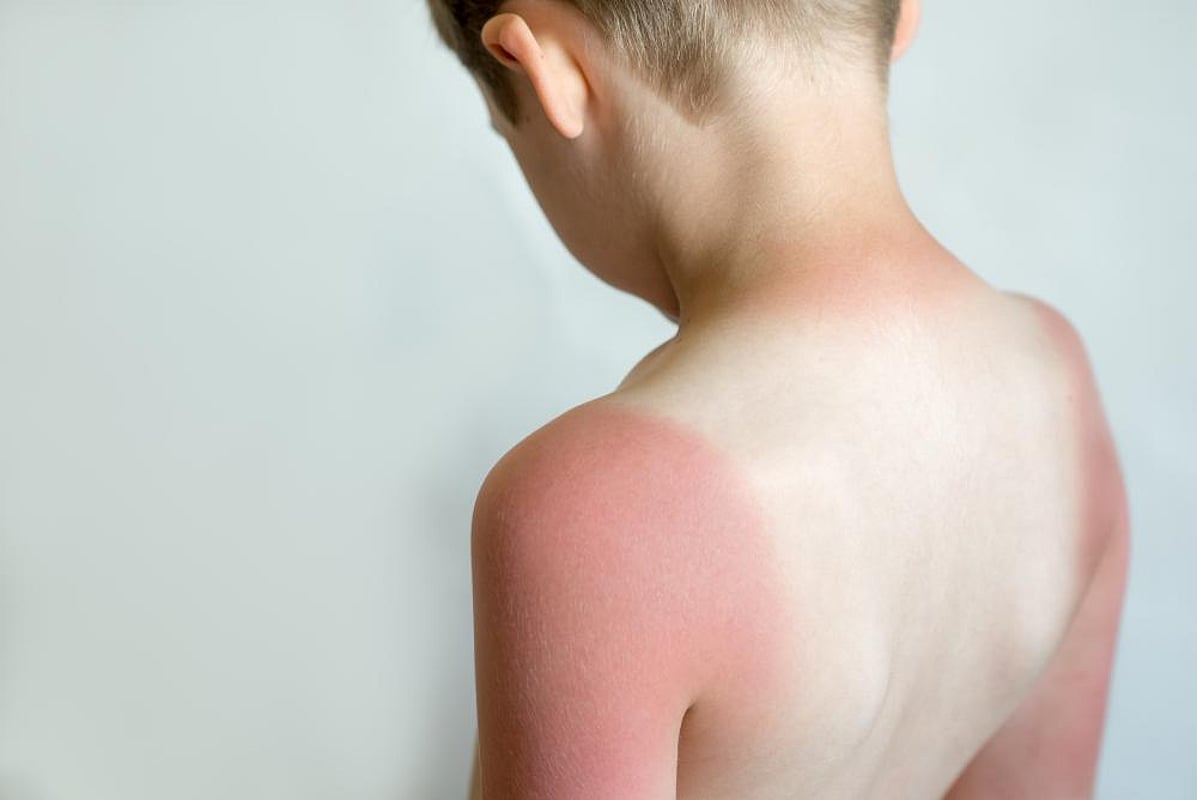Sunburns (Children)

What's the best way to treat a sunburn?
For starters, make sure your child drinks plenty of water; he's probably dehydrated from being out in the sun. To soothe the sunburned area, apply a cold washcloth or let your child soak in a cool bath. (Adding baking soda or Aveeno colloidal oatmeal to the water can make it more soothing.) Acetaminophen or ibuprofen can also ease the pain.
Avoid using petroleum-based products like Vaseline, which prevent heat and sweat from escaping and can worsen a burn. Also avoid first-aid products that contain benzocaine, which can cause irritation or allergic reactions. Don't be alarmed if your child's skin begins to peel; it's a natural part of the healing process. Apply a moisturizing lotion or aloe vera gel to relieve itching, and make sure he stays in the shade until the skin has healed.
What if the skin blisters?
Blistering signals a more serious sunburn. Don't cover the blisters. Call your doctor for advice.
Is skin damage from the sun worth worrying about?
Yes. Ultraviolet radiation from the sun is the number one cause of skin cancers of all kinds. Fair-haired, pale-skinned, freckled, and green- or blue-eyed children are most at risk. But excessive exposure to the sun's burning rays is dangerous for anyone. About one-quarter of your lifetime sun exposure occurs during childhood, and some studies suggest that severe sunburns during childhood may cause melanoma, the deadliest form of skin cancer, later in life. Avoiding exposure and using sunscreen regularly can reduce the risk of certain skin cancers. Repeated sun exposure also causes wrinkling, sagging skin and other signs of premature aging. It's a good idea to avoid sun exposure between 10 a.m. and 4 p.m. if possible and to use sunscreen all year round. Babies under six months should be kept out of the sun as much as possible.
Do sunscreens really protect against sunburns?
The newer sunscreens do a good job of blocking the sun's burning ultraviolet rays. Experts recommend using a sunscreen with a sun protection factor (SPF) of 15 or higher. Choose a broad-spectrum product that protects against both UVA and UVB rays. Then lay it on thick and rub it in well 30 minutes before your child goes out into the sun (to give the sunscreen time to create a barrier). Pay special attention to areas most likely to get burned, such as ears, nose, back of the neck, shoulders, and tops of the feet. Reapply every two hours. If your kids will be sweating a lot or playing in the water, you may want to use a waterproof sunscreen, which stays on longer, but you'll still need to reapply every time they go swimming or dry off with a towel. Remember: Sunscreens only work if you apply them liberally to all exposed areas of the skin and reapply them frequently. And it's always wise to use several forms of protection -- hats, pants, long-sleeved shirts, and sunscreen.
Should my child wear sunglasses?
Protecting your child's eyes is just as important as protecting his skin, since ultraviolet radiation is linked to increased risk of cataracts later in life. Choose sunglasses that block both kinds of UV rays. To encourage your child to wear sunglasses, let him choose a pair he really likes. If you wear sunglasses regularly, your child will likely do the same.
Further Resources
National Institute of Child Health & Human Development
http://www.ehs.okstate.edu/chapters/UV_Sun_Skin.htm
References
Berg, Alfred O: Counseling to Prevent Skin Cancer: Recommendations and Rationale of the U.S. Preventive Services Task Force. Mortality and Morbidity Weekly Report.
Robert H. Pantell M.D., James F. Fries M.D., Donald M. Vickery M.D., Taking Care of Your Child: A Parent's Illustrated Guide to Complete Medical Care. Da Capo Press.
American Academy of Pediatrics, HealthyChildren.org. Sunburn: Treatment and Prevention. http://www.healthychildren.org/English/safety-prevention/at-play/pages/Sunburn-Treatment-And-Prevention.aspx
Skin Cancer Foundation. Skin Cancer Facts.
Related Posts
Cooler Noses May Be Key to Winter’s Spike in Colds
TUESDAY, Dec. 6, 2022 (HealthDay News) -- Researchers may have sniffed out why...
Health Highlights: July 12, 2022
Abortion bans could put lives of cancer patients in jeopardy. Many treatments...
Un nuevo medicamento inyectado podría prevenir la COVID grave
JUEVES, 9 de febrero de 2023 (HealthDay News) -- Una sola inyección de un...
Prevalence of Dementia Estimated at 10 Percent in 2016
MONDAY, Oct. 24, 2022 (HealthDay News) -- The national prevalence of dementia in...
